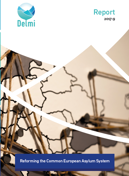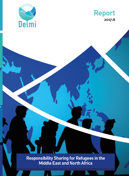This Delmi report examines the division of responsibilities for those in need of protection from a global perspective. It analyzes past and present models and discusses its feasibility in practice.
Some overall conclusions and recommendations
- There is a need for different mechanisms to achieve division of responsibilities at global and regional level. At the same time, it is unlikely that an effective division of responsibilities can be achieved through an individual legal solution or through a central distribution system.
- A number of complementary solutions are required - analytical, political and operational - to avoid the problem of collective action failure.
- An index of division of responsibilities can be used to measure government efforts as well as to contribute to creating a normative framework for how states should act.
- An overriding principle should be that the division of responsibilities aims to strengthen rather than undermine refugees' access to protection and support.
- Relevant international institutions must have the prerequisites for political analysis and political anchoring work in order for effective business structures to be developed.
- New operational tools need to be developed, among other things to meet the need for preferential matching and migrants' need for legal avenues.
About the authors
The report, A Fair Distribution: Division of Responsibility for the Needy (2017: 10), has been written by Alexander Betts, Professor in Forced Migration and International Affairs, and Director of the Refugee Studies Centre at the University of Oxford, Cathryn Costello, Associate Professor at the Refugee Studies Centre, the University of Oxford and Natascha Zaun, Assistant Professor at the London School of Economics.
Picture by parvel from Pixabay.


